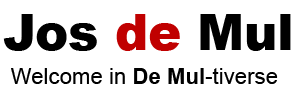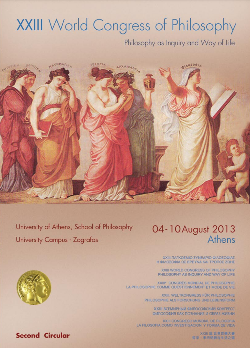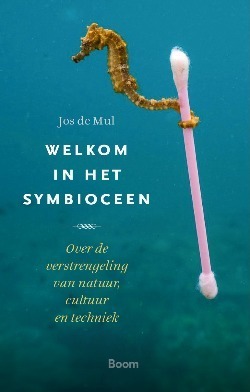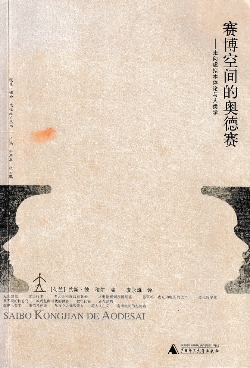Jos de Mul, The (Bio)technological Sublime. After Hours Conversation lecture. Institute for Advanced Study, Princeton, October 2, 2012.

In our (post)modern world it is no longer the superior forces of nature that calls forth the experience of the sublime, but rather, the superior forces of technology. However, with the transfer of power from divine nature to human technology, the ambiguous experience of the sublime also nests in the latter. In the era of converging technologies – information technology, biotechnology, nanotechnology and the neurosciences – it is technology itself that gains an ungeheuer character in its battle with nature. Without doubt these technologies have increased our power over nature enourmously.

However, this does not mean that we have become gods in the sense that we have gained control over our own destiny. Rather, our relation with nature is changing:
Where technology and nature are traditionally seen as opposed to each other, they now appear to merge or even trade places. While old nature, in the sense of trees, plants, animals, atoms, or climate, is increasingly controlled and governed by man – it is turned into a cultural category –, our technological environment becomes so complex and uncontrollable, that we start to relate to it as a nature of its own.
While technology is an expression of the grandeur of the human intellect, we also increasingly experience it as a force that controls and threatens us. Technologies such as atomic power station and genetic modification, to mention just two paradigmatic examples, are Janus-faced: they reflect, at once, our hope for the benefits they may bring as well as our fear of their uncontrollable, destructive potentials.
At first sight it seems that in these cases technology completely controls and conquers nature. However, in the fast growing domain of the biotechnologies (which will probably become as important in the twenty-first century as the physical sciences were in the twentieth century), we witness a remarkable revenge of nature within technology. After all, technologies like genetic modification and synthetic biology create entities that are no longer passive manipulatable innate elements, but have, and will increasingly have, their ‘own agenda’.
A full version of this lecture will be published in the Spring 2013 issue of the Institute Letter of the IAS.




 The nation state, imagined as a formation encompassing a culturally unified people, is now straining under the challenges of globalization and the revolution in communication technology. This conference will consider the dynamic changes that are currently taking place with respect to cultural and religious diversity as a result of the explosion in communication technologies, address the conflicts they give rise to, and discuss the ramifications for both law and politics.
The nation state, imagined as a formation encompassing a culturally unified people, is now straining under the challenges of globalization and the revolution in communication technology. This conference will consider the dynamic changes that are currently taking place with respect to cultural and religious diversity as a result of the explosion in communication technologies, address the conflicts they give rise to, and discuss the ramifications for both law and politics.
 In his essay ‘The Idea of Europe’ George Steiner claims that European culture derives from “a primordial duality, the twofold inheritance of Athens and Jerusalem”. For Steiner, the relationship between Greek rationalism and Jewish religion, which is at once conflictual and syncretic, has engaged the entire history of European philosophy, morality, and politics. However, given this definition, at present the United States of America seem to be more European that ‘the old Europe’ itself. Against Steiner, it will be argued that in order to fathom the distinctive characteristic of European culture, we have to take a third European tradition into account, which is inextricably bound up with Athens: the tradition of Greek tragedy. If we may call Europe a tragic continent, it is not only because its history is characterised by an abundance of real political tragedies, but also because it embodies, as an idea and an ideal, a tragic awareness of the fragility of human life. Instead of reducing the ‘idea of Europe’ to a financial and economic issue, Europe should remain faithful to this idea and ideal.
In his essay ‘The Idea of Europe’ George Steiner claims that European culture derives from “a primordial duality, the twofold inheritance of Athens and Jerusalem”. For Steiner, the relationship between Greek rationalism and Jewish religion, which is at once conflictual and syncretic, has engaged the entire history of European philosophy, morality, and politics. However, given this definition, at present the United States of America seem to be more European that ‘the old Europe’ itself. Against Steiner, it will be argued that in order to fathom the distinctive characteristic of European culture, we have to take a third European tradition into account, which is inextricably bound up with Athens: the tradition of Greek tragedy. If we may call Europe a tragic continent, it is not only because its history is characterised by an abundance of real political tragedies, but also because it embodies, as an idea and an ideal, a tragic awareness of the fragility of human life. Instead of reducing the ‘idea of Europe’ to a financial and economic issue, Europe should remain faithful to this idea and ideal.



 The city, too, is landscape. We can leave it by going into nature exchanging the urban for the rural, but we can also enter the city to live within the architecture and contemplate its forms. Every architectural structure is a landscape and promotes an educational or paedeumatic relationship between the spirit and the environment. Our gaze and our bodies activate a certain way of contemplating that promotes the interchange between the external perception of the physical world and an internal seeing, which is the psychic perception of the visual image. There is a close relationship between the aesthetic experience of the natural environment and that of the urban landscape. In the same way that humankind lives on the earth so, too, it lives in the city.
The city, too, is landscape. We can leave it by going into nature exchanging the urban for the rural, but we can also enter the city to live within the architecture and contemplate its forms. Every architectural structure is a landscape and promotes an educational or paedeumatic relationship between the spirit and the environment. Our gaze and our bodies activate a certain way of contemplating that promotes the interchange between the external perception of the physical world and an internal seeing, which is the psychic perception of the visual image. There is a close relationship between the aesthetic experience of the natural environment and that of the urban landscape. In the same way that humankind lives on the earth so, too, it lives in the city. Pim & Geert. Tien jaar Nederlands populisme. Voordracht ter gelegenheid van de Maand van de Filosofie. Maastricht: Centre Céramique. Zondag 15 april 2012 | 15.00-16.30 uurOp 6 mei 2012 zal het precies tien jaar geleden zijn dat de populaire en populistische politicus Pim Fortuyn op het Mediapark in Hilversum op brute wijze werd doodgeschoten door milieu-activist Volkert van der Graaf. De moord markeerde het begin van een turbulent decennium in de Nederlandse politiek, dat in het teken stond van de opmars van populisten zoals Verdonk en Wilders, een vergaande polarisatie en verruwing, en de val van vier kabinetten Balkenende. De door vele schermutselingen gekenmerkte gedoogsamenwerking van Rutte, Verhage en Wilders laat zien dat de politieke rust nog geenszins is teruggekeerd.
Pim & Geert. Tien jaar Nederlands populisme. Voordracht ter gelegenheid van de Maand van de Filosofie. Maastricht: Centre Céramique. Zondag 15 april 2012 | 15.00-16.30 uurOp 6 mei 2012 zal het precies tien jaar geleden zijn dat de populaire en populistische politicus Pim Fortuyn op het Mediapark in Hilversum op brute wijze werd doodgeschoten door milieu-activist Volkert van der Graaf. De moord markeerde het begin van een turbulent decennium in de Nederlandse politiek, dat in het teken stond van de opmars van populisten zoals Verdonk en Wilders, een vergaande polarisatie en verruwing, en de val van vier kabinetten Balkenende. De door vele schermutselingen gekenmerkte gedoogsamenwerking van Rutte, Verhage en Wilders laat zien dat de politieke rust nog geenszins is teruggekeerd.







